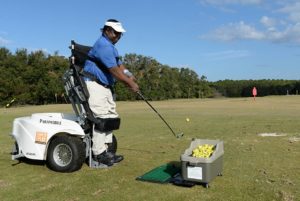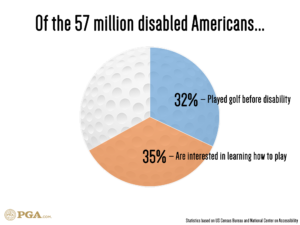By Rich O’Brien
I often see stories written by colleagues that suggest the game is dying because it is too difficult for new players to learn. They often cite the number of players learning the game is equal to the number of players leaving the game.
This superficial overview of the numbers does not represent the true picture of what is happening, however. Dig a little deeper, you begin to see that this analysis totally ignores the fact that each year hundreds of thousands of golfers, many of them avid players, suffer an injury, illness, or other physical challenge that forces them away from the game.
Research by the National Center for Accessibility indicates that 22% of the 57 million individuals with a “disability” in the United States enjoyed golf before their injury, but no longer play the game. Thus, there are approximately 13 million former golfers that would benefit from an invitation to attend a series of golf clinics, designed to give them back the gift of golf.
When compared to approximately 25 million active golfers, 13 million represents a sizable growth market, for the golf industry. It also brings sharp clarity, where funding could be directed to positively reverse this negative trend. At the same time, focus on ‘Adaptive Golf, would provide hope and enjoyment for physically challenged individuals.
As a college golf coach, I worked with elite golfers. When I was injured, I used my educational background, in sport psychology and exercise science, to improvise, adapt, and overcome those severe injuries. It required years of hard work and 12,000 hours of rehabilitation. Eventually, I was able to achieve my goals of overcoming my catastrophic injuries and eventually made it all the way back to be able to play the game at a high level, once again.
The growth mindset was an integral part of my own recovery. When I was asked to help others, I did not hesitate. The programs founded in South Carolina have become the model for adaptive golf therapy programs in other communities.
The Golf Therapy group on Facebook currently has more than 7,700 active members. It is a collection of adaptive golfers, leaders of adaptive golf groups, as well as, PGA Professionals and has inspired new adaptive golf groups across the United States.
Hopefully our work resonates with many people, who have been stricken with a physical limitation. Adopting a victim’s mentality does not help one overcome diversity.
Words are Important
Personally, I dislike the term disability, as it implies a fixed mindset and victimhood. From a growth mindset, the words injury, illnesses, or challenges give individuals HOPE!
That’s a big difference, one gives hope, while the other does not.
Adaptive golf is also a more positive reference, to the training programs created to use golf as therapy. Individuals work with caring instructors and therapists to learn skills to improve the quality of their lives.
Once the participants, in our adaptive golf programs, are ready to leave the driving range and venture onto the course, they want to compete.
 They simply want a level playing field.
They simply want a level playing field.
The Rules Modifications for ‘Golfers With Disabilities’ published jointly by the USGA and The R&A provide accommodations to allow golfers with various “disabilities” the opportunity to compete head-to-head against other golfers.
In the United States competitive opportunities for “disabled” golfers, however, are few and far between. “Disabled” golf organizations have run championship tournaments for decades, but to date they have not received support from the USGA or other major golf organizations.
There are more opportunities in Europe, thanks to the groundbreaking work of Tony Bennett and the European Disabled Golf Association (EDGA).
The Europeans have established the model for “disabled” golfers and physically challenged golfers now can regularly compete against other adaptive golfers.
The EDGA model could be used to host similar events in this country, as well as, around the world.
Tony Bennett and the Europeans are also leading the effort to have golf recognized as a Paralympic sport. An important step in this process was The R&A joining the effort.
The EDGA represents 17 countries and several of them support this initiative. The USGA as the national governing body has not yet agreed to sponsor a team to the Paralympics, but does have until later this year to insure that adaptive golf can be added as a sport in the 2024 Paralympics.
Adaptive golf is not only positioned to help physically challenged individuals with ‘Golf Therapy,’ but it could also become a growth segment for the game of golf.
If you would like to know more about ‘Adaptive Golf’ programs, watch this video from CBS: https://youtu.be/AUAq6fF-9LA, or contact Rich O’Brien through Facebook: https://www.facebook.com/richobriengolf/








